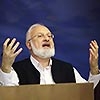I Want The Light!
 Question: I just can’t seem to understand: What is the Light that reforms? And how can I demand it during the study?
Question: I just can’t seem to understand: What is the Light that reforms? And how can I demand it during the study?
Answer: 1. At the very least, try to recognize all of these qualities inside of you which we read about in The Book of Zohar. Try to discern where they are inside of you, “rummage” inside of your desires, thoughts, and inside yourself.
That is how you expand your inner Kelim, desires, and qualities of perception. As you search among them, you begin to differentiate between them. But all of these qualities already exist inside of you.
2. If I don’t have a need for correction, then to me the words “the Light that reforms” are devoid of life. If I require correction, then I expect this Light. But if I don’t have this need, then I don’t know what this Light is.
I am told, “You have to wait for the Light to come.” Fine, so let it come. The sages say it’s good, and I agree. If that’s my attitude, then I cannot attract it.
It is written that one must await salvation at every moment. “The Creator’s salvation comes in the blink of an eye.” This is talking precisely about the correcting Light, the Light that reforms, bringing us back to the Creator.
The action we demand from above must always be preceded by our desire, the need for it. Otherwise it will never happen. Either we elicit the suffering inside of us on our own, which is “the suffering of love,” a passionate desire for the Light, or it will come in the form of compulsory suffering, by the path of “Beito” (in due time).
However, without suffering, without a question and without a desire, I cannot attain the correcting Light. That’s because the Light is at absolute rest. We only need the desire so the correcting Light would influence us.
We could say that the Light is present inside of the desire, but is revealed only when this desire reaches the true measure.
[40438]
From the 2nd part of the Daily Kabbalah Lesson 4/12/11, The Zohar
Related Material:
Finishing The Creator’s Words For Him
A Guide To Your Feelings
A Sign Of Spiritual Progress








